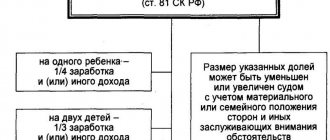The Petrovs divorced. The man had already prepared to pay alimony for his son, but for some reason his ex-wife did not file for it. Petrov himself is ready to allocate money to the child, but he does not know how to do it correctly - what if one fine day the bailiffs begin to demand alimony for the period when he was already paying?
We will tell you what a spouse should do if his ex-wife does not file for alimony. For advice on calculating alimony, amounts of payments and necessary documents, contact a professional family law lawyer.
When and who pays child support?
Protecting children and providing them with a supportive environment that enables effective intellectual, moral and physical development should be a priority for parents. However, when a family breaks up, the obligation to provide financial support for children is, in practice, more often fulfilled by only one parent with whom the children live. Gloomy statistics suggest that evasion of the responsibility to provide financial support to children is becoming commonplace.
Alimony payments are the obligation of parents to a child or children. Such financial support should be provided by the parent who lives separately after the divorce. The Family Code states that ensuring the interests of children is the primary concern of their parents.
The basis for paying alimony is the fact of blood relationship. The rights and obligations of parents and children arise from the fact of relationship between parents and children, certified in the manner prescribed by law - this interpretation is confirmed by paragraph 29 of the Resolution of the Plenum of the Supreme Court of the Russian Federation No. 16 of May 16, 2021. Art. No. 80 of the RF IC establishes the equal obligation of both parents to support common minor children.
Main aspects:
- Parents can themselves determine the form and procedure for paying alimony; they have the right to enter into an agreement on the payment of alimony in accordance with Art. 16 IC RF.
- If parents cannot independently agree on the maintenance of children under 18 years of age, the amount of alimony after a divorce is determined by the court.
- If payments for the maintenance of the child are not made, the guardianship and trusteeship authority has the right to apply to the judicial authority with a claim for the recovery of alimony for the maintenance of children under 18 years of age from both parents or one of them.
Lack of work
Life is unpredictable. Therefore, we often have to deal with non-standard situations. “My wife filed for alimony, and I am unemployed. What should I do?" - Questions of this type are not so rare. In addition, you may encounter unofficial employment with your spouse. What can a woman count on in this case?
Has your current or ex-wife filed for alimony? What to do? It is enough to prove the fact of the absence of official income. A woman can claim her maintenance only when the man has the opportunity to pay. This means that the lack of official work is grounds for exemption from alimony. But not in all cases.
In practice, even under such circumstances, you can demand money from your spouse. Achieving justice is difficult, but possible. The wife will have to prove her husband’s unofficial earnings or his solvency. Only then will she have the right to receive money “for herself.”
What is an agreement between parents
A husband and wife can agree on financial support for a child (alimony) without the participation of the court. In the modern world, no one believes words and promises anymore, so parents should take this issue seriously. To draw up a voluntary agreement indicating what the amount of alimony will be in the event of a divorce, parents need to come to a notary’s office and enter into a written agreement, which will be certified by a notary. If the terms of this document are violated, then in order to compulsorily collect alimony, you will need to go to court.
Results
Now it’s clear what to do if the wife filed for alimony. It is enough for a man to prove that he has no official income (for example, to quit his job) in order not to pay the woman at all. These are the rules that apply today in Russia. The wife will not be able to get a penny from her husband if he does not have money.
The situation is different with child support. In this case, you will have to pay anyway. But you can try:
- determine the place of residence of minors with their father, then the mother of the children pays child support;
- deprive the mother of parental rights - no money is paid to the woman in principle;
- limit the mother's rights as a parent - the right to alimony is lost.
There are no more options for the development of events. In the case of common-law wives, you can try to prove that the child is not from the defendant. No one is obligated to pay money to support other people's children. Otherwise, common-law wives have no real rights to financial support from their spouse. You can't demand it.
Amount of alimony
Statistics and legal practice show that in Russia children most often end up living with their mother, so the main question that women ask specialists is how much alimony the father pays during a divorce. The amount of alimony in a divorce for one child will differ from the amount that should be provided for several minor children.
The amount of alimony payments is specified in Art. 81 Family Code:
- per child is entitled to a payment in the amount of ¼ (25 percent) of the income (salary or other income in rubles or foreign currency) of the defendant (father or mother);
- if there are two offspring, the parent must allocate a third of his income for the maintenance of the children;
- 50 percent of income will have to be paid for three or more children.
Based on the financial situation of the parties and exceptional circumstances (lack of suitable housing, serious illness, injuries), the size of the shares may be increased, and in case of low wages and poor health of the payer, the amount of payments may be reduced. To reduce or increase child support, you need to go to court.
Decree
Can a wife apply for alimony while still in an official relationship? Yes. Especially if she is on maternity leave due to caring for common children. This is a fairly common occurrence.
In this case, alimony for the maintenance of the wife during marriage will be calculated taking into account the financial situation of each spouse. The legislation of the Russian Federation does not have any clear guidelines regarding how much money can be required when caring for a child. Usually the exact amount is tied to the cost of living in a particular region.
How much alimony should I pay my wife during a divorce?
Article No. 89 of the RF IC explains that spouses are obliged to support each other if they have sufficient means for this under certain circumstances.
Namely:
- if the wife is disabled;
- if the woman is pregnant;
- if the wife cannot work because she is raising a child under three years old;
- if the spouse is caring for a common disabled minor child.
How much alimony to pay to the wife during a divorce under such circumstances can be determined by the former spouses themselves by signing an agreement. Another option is to go to court. Then the amount of accruals in a fixed monetary amount will be determined.
It is worth consulting with a lawyer about the amount of alimony a wife is supposed to pay after a divorce.
What happens if the wife does not file for alimony?
If your ex-spouse refuses to sue for child benefits, you shouldn’t relax. According to Article 107 of the Family Code, a wife can apply for alimony at any time. In this case, alimony is awarded from the day the ex-wife applies to the court. If the application for payments occurred on October 20, then from that day the ex-husband begins to pay.
Alimony may also be demanded for previous periods if the wife tried to receive payments before filing a claim in court, but the husband avoided providing for the child. If you did pay, then you can try to prove it to the court - present checks, receipts, witnesses.
For your information. The wife has the right to demand alimony for the previous 3 years.
Procedure for collecting a fine
If a parent obligated to pay child support fails to pay it once, twice, three or more times, a fine may be collected from him. A fine is liability for non-fulfillment or improper fulfillment of obligations. The culprit pays the alimony recipient a penalty in the amount of 0.1% of the debt amount for each day of delay.
To collect a fine for late payment of alimony, you need to contact a bailiff. Next, the alimony arrears will be calculated. If the alimony payment is charged in proportion to all types of earnings and the defendant had no official income, the debt is calculated taking into account the average Russian salary at the time of debt collection. After this, it is necessary to prepare a claim for the recovery of alimony from the father or mother.
How to prepare objections, counterclaims, claims for reduction of payments?
First, you need to find a sample application. It can be:
- download on the Internet;
- meet at the court reception.
It is better to contact a lawyer in civil matters, or better yet, in family matters, so that he can competently prepare the document. Done by a professional is a guarantee of no problems.
Please note that objections are drawn up in free form. The main thing is to indicate in the text:
- what the defendant does not agree with;
- which he agrees with.
It is also necessary to emphasize those points that prove the defendant’s position. The most advantageous position is occupied by the defendant who filed a counterclaim. If, of course, his demands are justified. He becomes a plaintiff in the case, without ceasing to be a defendant, naturally.
The law imposes the same requirements on a counterclaim as on any other claim. They are contained in the Code of Civil Procedure of the Russian Federation.
In particular, the counterclaim must contain the following information:
- about the court to which he is sent;
- about the parties;
- about the substance of the dispute;
- on the rules of law governing legal relations;
- about the applicant's requirements.
The document must be accompanied by copies of all papers that serve as evidence and a receipt for payment of the state duty.
Collection of funds for the maintenance of a wife after divorce
According to the RF IC, a spouse can also receive alimony in certain cases. These include:
- disability;
- recognition as incompetent;
- pregnancy or maternity leave.
Until the child turns 3 years old, the husband is obliged to support his wife (even after divorce). Nothing prevents you from filing an application for support for yourself and your child, which women use quite often. However, it is necessary to take into account the real income of both parties. If the spouse has sufficient income to support herself independently, then the claim may be denied.
What are alimony obligations and alimony?
Property legal relations regulated by family law, which arise on the basis of an agreement between the parties or by a court decision, are called alimony obligations. They determine the obligation of some family members to provide material support to others, and the latter are assigned the right to demand them.
Such obligations are determined by the RF IC according to the subjective composition for three groups of citizens:
- – children and parents, as well as other family members;
- – spouses and former spouses.
The legislation regulates the procedure for determining the amount of alimony payments, provides for their forms, and also spells out the mechanism for assigning and withholding.
Find out more about what alimony is.
What income is withheld?
It should be remembered that alimony during a divorce may not be written off from all types of income. The amount of child support for one child or for two children may be charged from:
- official salary;
- income received as a result of the sale of goods or provision of services;
- additional payments assigned for professional skills;
- payments that are accrued for time worked in a public position;
- pensions and bonuses thereto;
- benefits that are prescribed for temporary disability;
- benefits from the labor exchange if the divorced spouse is employed by it;
- income received as a result of renting out property;
- scholarship provided by an educational institution.
There are also payments from which the write-off of alimony is prohibited. Their list is enshrined in Article 101 of Federal Law No. 229. In accordance with the provisions of the regulatory legal act, child support payments cannot be made with:
- survivor's benefit;
- funds provided as maternity capital;
- money that was provided to a parent as compensation for being injured while on duty;
- compensation provided for caring for disabled persons;
- social benefit provided for funeral.
When calculating alimony, you need to remember that the court will take into account only the official income of the spouse living separately.
Collection of alimony in a fixed amount
What to do if there is nothing to collect alimony from? That is, if the defendant does not have a job or deliberately does odd jobs so as not to have to pay money to his child. The Law leaves no loopholes for such cunning people.
Article 83 of the RF IC provides for the possibility of collecting alimony in a fixed amount. According to the Law, it cannot be less than the minimum subsistence budget for a minor child established in the region of his residence. If such an indicator is not derived, the national minimum security for this age category should be taken as the starting point for the calculation.
Due to the unstable financial situation in the country, the court decision on the collection of alimony contains a requirement for periodic indexation of the amount paid based on the inflation rate officially adopted by the Central Bank for the current year.
Both voluntary payments, and the withholding of part of the income, and a fixed sum of money are required to be paid in the form of alimony. For delays and arrears of payments, a penalty may be charged. For refusal to fulfill obligations, various types of liability are provided, including criminal penalties.
Payment methods
The court may award alimony as a percentage of the payer's earnings or in a fixed amount.
For one child, the minimum percentage of earnings will be 25%, for two children you will have to pay a third of the income, and for three or more - half.
The fixed amount is determined based on several factors - the financial situation of the parties, their state of health, and so on.
How to collect alimony through court
If a married couple has young children, then when considering an application for divorce, alimony can be automatically collected by the judicial authority, regardless of whether the potential recipient of alimony benefits asked for it or not. Of course, if the plaintiff directly writes in the application about alimony requirements and offers the judge his version of resolving the controversial issue for consideration, this will help the court to correctly understand the applicant’s claims. As a result, such actions can lead to speeding up the proceedings.
What to do if the divorce and division of property took place, but issues regarding alimony were not resolved by mutual agreement, you can read further.
Jurisdiction of alimony cases
Depending on the circumstances relevant to the court, alimony cases are dealt with in different legal proceedings. Information about this is systematized in the table.
| Type of proceedings | Categories of cases |
| Prikaznoe | According to the rules of writ proceedings, disputes are resolved where:
|
| Claim | All other matters, regardless of difficulty level. |
The difference between writ proceedings and claims is as follows:
- In a case heard according to the norms of writ proceedings, the parties do not need to attend the court hearing.
- In terms of deadlines, it passes faster than the claim. The law allocates 5 days for issuing an order, and 1 month for legal proceedings in alimony cases.
Two types of judicial bodies are authorized to resolve cases of awarding alimony payments.
| Name of the court | Categories of cases |
| World court | Any disputes regarding the collection of child support benefits, except for cases in which the parents require the judge to make a decision on one of the following issues:
|
| District judicial body | Resolves cases regarding the award of alimony payments if there is a dispute between the parties:
|
Jurisdiction
With regard to jurisdiction in alimony cases, Russian procedural legislation establishes that the plaintiff can deviate from the rules requiring consideration of cases at the location of the defendant. In other words, the plaintiff has the right to transfer the case of claiming alimony benefits to the judicial authority of the locality where he lives.
When can you apply for alimony after a divorce?
The statute of limitations for alimony cases depends on whether, before applying to the court, an agreement was concluded between the spouses on the payment of alimony or not.
| Availability of alimony agreement before filing a claim | Deadline for application |
| Yes | Indefinitely. It does not matter to the court whether the recipient has the right to alimony at the time of application or not. It is important that the recipient has this right in the past. If the case is won, the recipient acquires the opportunity to demand alimony money from the payer from the moment the application is submitted to the judicial authority. |
| No | Alimony maintenance can be recovered for the past three years, counted from the moment the claim is submitted to the court. At the same time, the judge checks evidence confirming the following 2 facts:
|
How to file a claim
To correctly write a statement of claim, you need to know the structure of this document. It consists of 3 sections:
- Top section. Here the applicant writes: Details of the judicial authority, such as name, postcode and address.
- Data about the defendant and plaintiff, for example, addresses, telephone numbers, other contact information, as well as last name, patronymic and first name.
- Information from the certificate of termination of family relations, if the parties to the proceeding were registered as spouses.
- A list of requirements, for example, the amount of alimony allowance the plaintiff is interested in.
How to properly file for alimony after a divorce: sample claim
In order not to resort to the expensive assistance of lawyers, you must be able to independently write a statement of claims and prepare additional papers for the trial. An example of a statement that will help the applicant in drawing up a claim document can be found at this link.
What documents need to be attached
The list of additional papers attached to the application consists of:
- Copies of all pages of the claimant's passport.
- A document confirming the termination of the marriage or evidence certifying the fact of living together in the case of a civil marriage.
- Marriage registration document. It is submitted to the court if, by the time the application is written, the married couple has not yet separated.
- Certificates from the applicant about the composition of his family.
- Documents for children, for example, their birth certificates.
- Paper confirming the transfer of fees for court services.
- A document confirming the amount of the defendant’s salary or other earnings.
- Evidence of disability, pregnancy or neediness of the claimant. Documents confirming the existence of appropriate grounds for receiving alimony benefits are indicated in the table in the chapter “Alimony for the maintenance of a former spouse.”
State duty
In any case, the plaintiff is exempt from paying a fee to the state treasury when filing a claim for alimony benefits. If the plaintiff wins, the burden of paying legal costs shifts to the defendant. He must pay:
- 150 rubles, if the dispute concerned alimony payments only for the maintenance of children or only for the maintenance of the other spouse.
- 300 rubles, if the plaintiff simultaneously demanded alimony both for himself and for common children.
The duty can be transferred to state treasury accounts in the following ways:
- Through an operator in a banking organization.
- Through ATMs.
- Online through Internet banking using an account or card linked to it.
- Through the State Services portal.
- Through services that work with electronic money, for example, WebMoney or Qiwi.
Consideration of the case
The law gives the judge one month to resolve alimony claims. The proceedings can take place either in the order of writ proceedings or by way of claim proceedings. The stages of consideration of the case, depending on the type of legal proceedings, are indicated in the table.
| Type of proceedings | Stages of the proceedings |
| Prikaznoe |
|
| Claim |
|
Judicial practice shows that in the vast majority of cases, alimony cases are resolved in favor of the applicant. The reason is that the obligation to provide financial support to children and, in some cases, former spouses is clearly stated in Russian family law.
What to do next
If the defendant does not intend to comply with the court decision voluntarily, it is necessary to transfer the writ of execution or order of the magistrate to the bailiff service. The bailiff department to which the enforcement documents are transferred must be located at the location of the defendant.
Currently, it is possible to transfer executive documents online. To do this you need to do the following:
- Log in to the State Services portal or register on it.
- Enter the phrase “Office of the Federal Bailiff Service” into the search bar.
- Find the appropriate link in the search results and click on it.
- Fill out the form on the page where you need to write your surname, patronymic and first name, as well as the surname, patronymic and first name of the payer. Next, indicate the name of the unit authorized by law to execute court documents. It must be located at the payer's location. Then attach a photo or scan of the judge’s order or writ of execution.
- Next, you need to write contact information so you can track the status of your application.
Legislative regulation
Legislators protect the rights and interests of minor citizens. The most important legislative act defining the obligations of parents towards children, as well as the procedure for withholding and transferring child support payments
is the Family Code. In addition, the country has other laws that determine the amount and procedure for alimony maintenance:
- civil legislation of the country;
- Labor Code (issues related to the collection of alimony payments from earnings and their amount);
- RF PP dated July 18, 1996 No. 841 (types of income from which alimony payments are withheld);
- Resolution of the Plenum of the Armed Forces of the Russian Federation No. 9 of October 25, 1996 (explains the attitude of the courts to the current family legislation);
- Federal Law of the Russian Federation No. 229 of October 2, 2007 (procedure for enforcement proceedings in cases of alimony maintenance);
- Order of the FSSP of the Russian Federation No. 318 on the rules for implementing enforcement proceedings in cases concerning the withholding and transfer of alimony.
Legislation may change, so citizens need to use up-to-date sources of information.
How to determine that a claim has been filed
In some cases, the alimony payer does not find out in time that legal proceedings have been initiated against him regarding alimony obligations.
A situation may arise, for example, when a given person does not live at the registration address, but in another place.
You can check whether a claim has been filed against a specific person in one of the following ways:
- Request information from the employer's accounting department.
- Find out information in court (you can search through the website).
- Ask the bailiff service for information (or use the site search).
The case can be heard in court both at the place of registration of the applicant and at the place of registration of the defendant. Therefore, it is recommended to check different areas of the magistrates.
You should start searching for information by using publicly available databases, such as the bailiff service database and the database of the relevant court.











